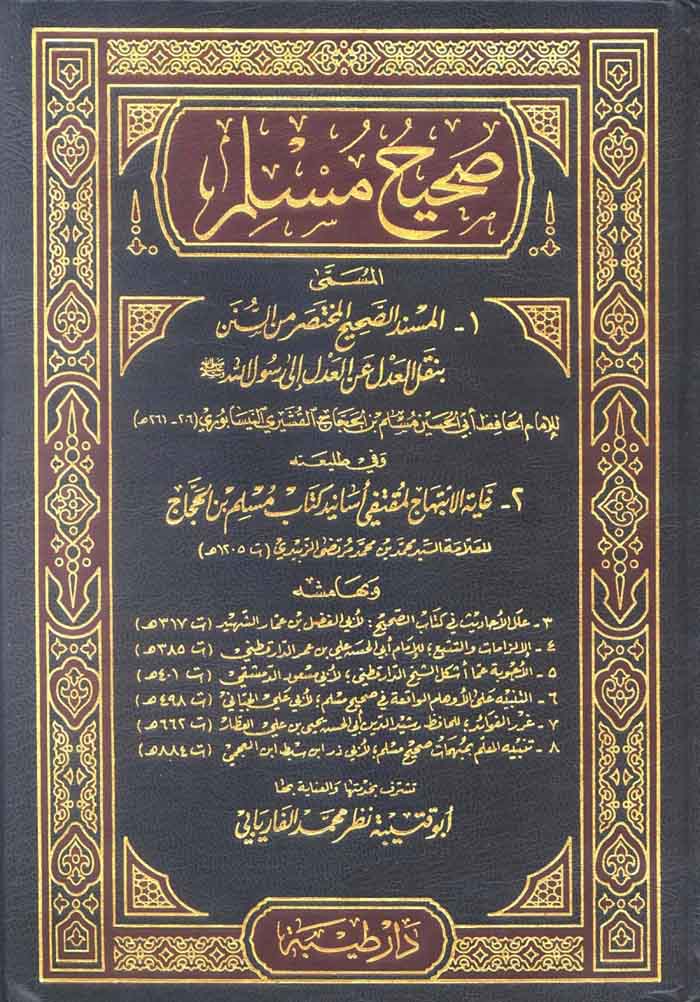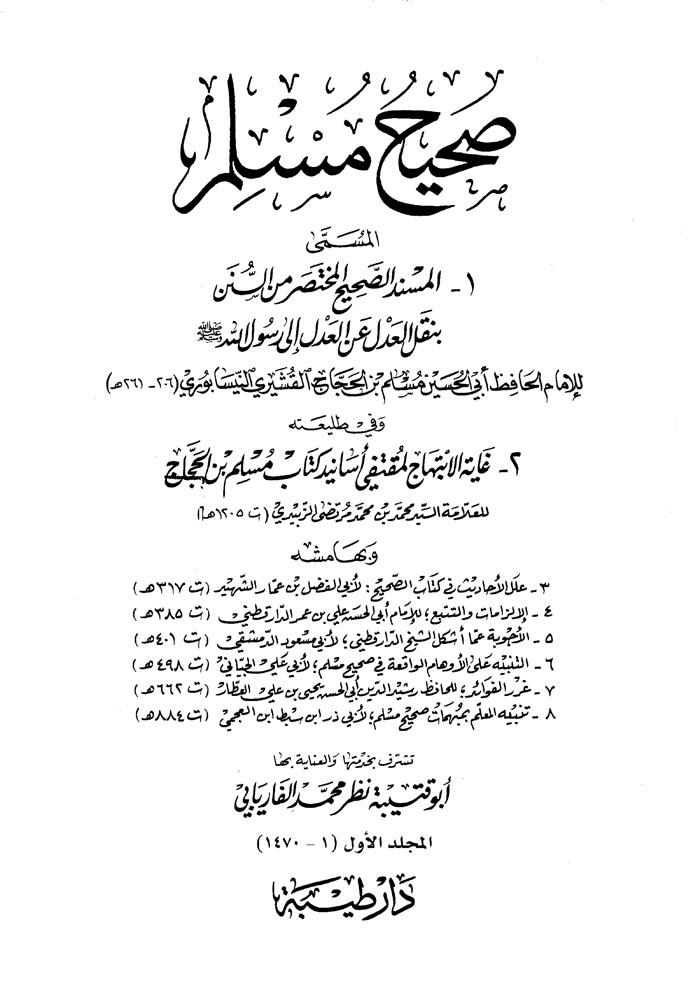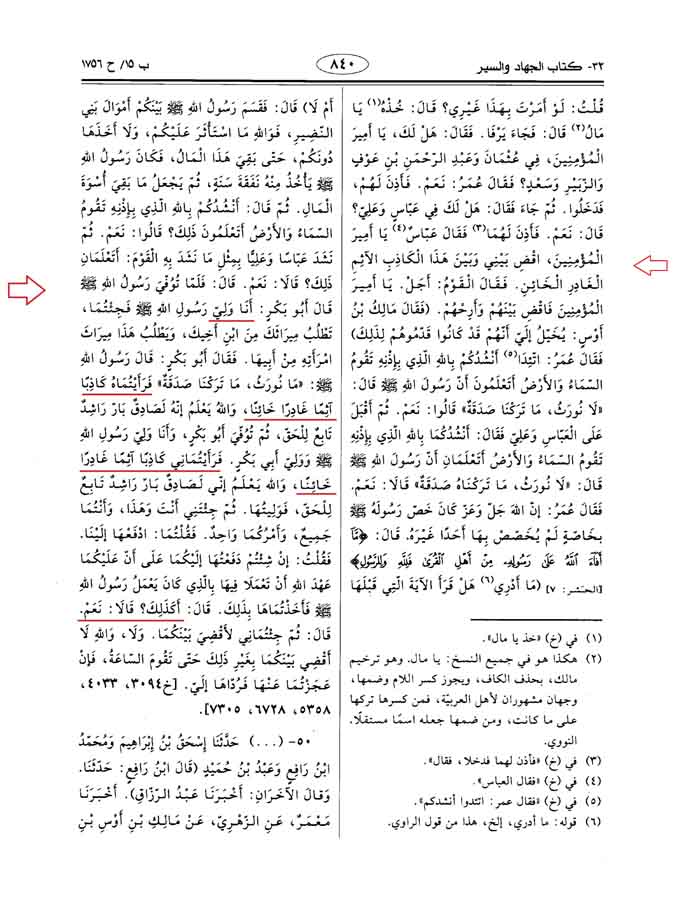However, we have already given a detailed and conclusive answer to these false Shubahat ;But this time and in this article, we try to expose the view point and opinion of Amir al-Mo'minin (pbuh) about the caliphs, from the most Sahih Sunni books, and and let our dear readers to judge by themselves.
According to the authentic narrations of al-Sindi, which are mentioned in the most authentic Sunni books, Amir al-Mo'minin (pbuh) has never had friendly relations with the three caliphs; Rather, he considered them as liars, Sinners, Deceivers, Traitors, Oppressors,Tyrants and so on..
Before presenting the evidence, we note that our aim is not to insult anyone's sanctity; Rather, it is only to quote from Sunni books, with the Sahih source and Isnad. And we leave the judgment to our dear Shia and Sunni readers.
Muslim Neyshabouri, in his book 'Sahih', narrates a long narration from Omar ibn al-Khattab who said to Amir al-Mo'minin (PBUH):
فَلَمَّا تُوُفِّيَ رَسُولُ اللَّهِ -صلي الله عليه وسلم- قَالَ أَبُو بَكْرٍ أَنَا وَلِيُّ رَسُولِ اللَّهِ -صلي الله عليه وسلم- فَجِئْتُمَا تَطْلُبُ مِيرَاثَكَ مِنَ ابْنِ أَخِيكَ وَيَطْلُبُ هَذَا مِيرَاثَ امْرَأَتِهِ مِنْ أَبِيهَا فَقَالَ أَبُو بَكْرٍ قَالَ رَسُولُ اللَّهِ -صلي الله عليه وسلم- « مَا نُورَثُ مَا تَرَكْنَا صَدَقَةٌ ». فَرَأَيْتُمَاهُ كَاذِبًا آثِمًا غَادِرًا خَائِنًا وَاللَّهُ يَعْلَمُ إِنَّهُ لَصَادِقٌ بَارٌّ رَاشِدٌ تَابِعٌ لِلْحَقِّ ثُمَّ تُوُفِّيَ أَبُو بَكْرٍ وَأَنَا وَلِيُّ رَسُولِ اللَّهِ -صلي الله عليه وسلم- وَوَلِيُّ أَبِي بَكْرٍ
فَرَأَيْتُمَانِي كَاذِبًا آثِمًا غَادِرًا خَائِنًا.
After the death of the Messenger of God (may God bless him and grant him peace), Abu Bakr said: I am the Wali (successor) of the Messenger of God. Abu Bakr said: The Messenger of God said: We do not inherit anything, what remains is a charity and you introduced him as a liar, a sinner, a deceiver and a traitor, while God knows that Abu Bakr is truthful and religious. And he was a follower of the truth. After the death of Abu Bakr, I became the Wali (successor) of the Prophet and Abu Bakr, and again, you two called me a traitor, a deceitful liar, and a sinner
Then, at the end of the narration, [mar ibn al-Khattab makes Amir al-Mo'minin and Abbas to admit:
قَالَ أَكَذَلِكَ قَالاَ نَعَمْ
Sahih Muslim, vol. 3, p. 1378, p. 1757
النيسابوري، مسلم بن الحجاج أبو الحسين القشيري (متوفاي261هـ)، صحيح مسلم، ج 3، ص 1378، ح 1757، كِتَاب
الْجِهَادِ وَالسِّيَرِ، بَاب حُكْمِ الْفَيْءِ، تحقيق: محمد فؤاد عبد الباقي، ناشر: دار إحياء التراث العربي - بيروت.
The same narration has been narrated in other Sunni books with the interpretation of "oppressor and tyrant" and even Albani the wahhabi, has also considered it as being Sahih
قَالَ وَأَنْتُمَا تَزْعُمَانِ أَنَّهُ كَانَ فِيهَا ظَالِمًا فَاجِرًا وَاللَّهُ يَعْلَمُ أَنَّهُ صَادِقٌ بَارٌّ تَابِعٌ لِلْحَقِّ ثُمَّ وُلِّيتُهَا بَعْدَ أَبِي بَكْرٍ سَنَتَيْنِ مِنْ إِِمَارَتِي فَعَمِلْتُ فِيهَا بِمِثْلِ مَا عَمِلَ فِيهَا رَسُولُ اللَّهِ صلي الله عليه وسلم وَأَبُو بَكْرٍ وَأَنْتُمَا تَزْعُمَانِ أَنِّي فِيهَا ظَالِمٌ فَاجِرٌ.
Omar said: You two believed that Abu Bakr was Oporessor and Tyrant in this case; While God knows, He was honest, benevolent, and a follower of the truth. After Abu Bakr, I stood in charge of the administration of Fadak for two years, and I had the same behavior as the Messenger of God (PBUH) and Abu Bakr; But you believed that I was an Oppressor and Tyrant.
الباني ، محمد ناصر الدين (متوفاي 1420هـ)، التعليقات الحسان علي صحيح إبن حبان ، ج9 ، ص319 ـ 320.
Al-Albani, Muhammad Nasser al-Din (d. 1420 AH), Al-Tasliqat al-Hasan al-Sahih ibn Hanban, vol. 9, pp. 319-320.
At the end of the narration, Al-Albani states that the source of this narration is Sahih.
The same narration is also mentioned in the authentic book of Ibn Habban with the research of Shoaib Al-Arnaout the Wahhabi, and this fanatical Wahhabi has also admitted that this source is Sahih.
According to these two narrations, Amir al-Mo'minin (PBUH) believed that Abu Bakr and Omar were "liars, evildoers, deceiver, traitors, oppressors and tyrants."
The interesting fact is that in Sahih Bukhari, these traits are considered as characteristics of hypocrites. Muhammad ibn Ismail writes in his book Sahih Bukhari:
حدثنا سُلَيْمَانُ أبو الرَّبِيعِ قال حدثنا إِسْمَاعِيلُ بن جَعْفَرٍ قال حدثنا نَافِعُ بن مَالِكِ بن أبي عَامِرٍ أبو سُهَيْلٍ عن أبيه عن أبي هُرَيْرَةَ عن النبي صلي الله عليه وسلم قال آيَةُ الْمُنَافِقِ ثَلَاثٌ إذا حَدَّثَ كَذَبَ وإذا وَعَدَ أَخْلَفَ وإذا أؤتمن خَانَ.
It is narrated from Abu Hurayrah that the Messenger of God (PBUH) said: The signs of a hypocrite are three things: When he speaks, he lies. When he makes a promise, he breaks it, and whenever he is entrusted, he betrays.
حدثنا قَبِيصَةُ بن عُقْبَةَ قال حدثنا سُفْيَانُ عن الْأَعْمَشِ عن عبد اللَّهِ بن مُرَّةَ عن مَسْرُوقٍ عن عبد اللَّهِ بن عَمْرٍو أَنَّ النبي صلي الله عليه وسلم قال أَرْبَعٌ من كُنَّ فيه كان مُنَافِقًا خَالِصًا وَمَنْ كانت فيه خَصْلَةٌ مِنْهُنَّ كانت فيه خَصْلَةٌ من النِّفَاقِ حتي يَدَعَهَا إذا أؤتمن خَانَ وإذا حَدَّثَ كَذَبَ وإذا عَاهَدَ غَدَرَ وإذا خَاصَمَ فَجَرَ.
It is narrated from Abdullah Ibn Umar that the Messenger of God (PBUH) said: There are four characteristics that if all of them are in a person, he is a pure hypocrite, and whenever one of these characteristics is in a person, he has a characteristic of hypocrites until he abandons it. Those charestristics are:
When he is entrusted, he betrays. When he speaks, he lies. When he makes a commitment, he deceives. And whenever he is at enmity with someone, he oppresses.
صحيح البخاري، كتاب الإيمان، بَاب عَلَامَةِ الْمُنَافِقِ ، ح33 و 34.
Sahih al-Bukhari, The Book of Faith, Bab al-'Alam al-Manafiq, H 33 and 34.
You can see that all the above attributes that were mentioned by the Messenger of God about the hypocrites and even more so, according to Amir al-Mo'minin, Imam Ali (PBUH)'s belief existed in Abu Bakr and Omar
******
Now our question from the awakened consciences is, How is it possible that Amir al-Mo'minin (PBUH) makes his daughter marry someone, whom he considers him as a "Liar, a Sinner, a Deceiver, a Traitor, an Oppressor and a Tyrant" ?!
How is it possible that Amir al-Mo'minin (PBUH) choose the names of his beloved children after the names of those whom he believes that are have collected all the moral attributes of hypocrites together in them? !!!
Good Luck





